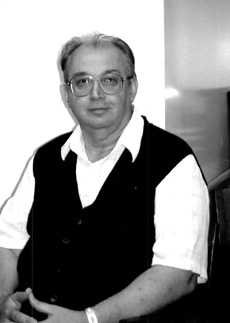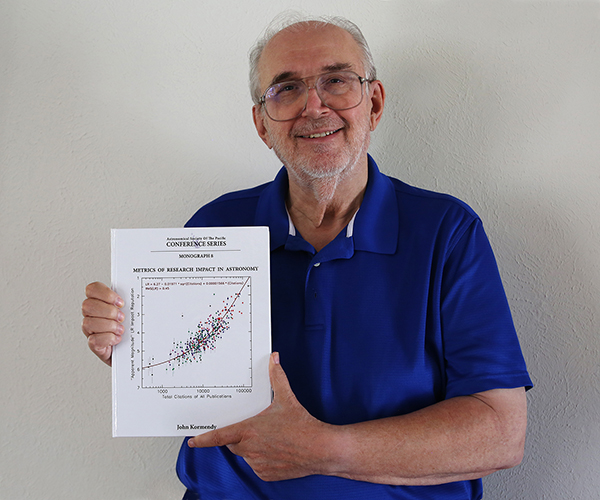John Kormendy Historical Interviews
CFHT Historical Interview

This is an interview by Liz Bryson, the librarian at the Canada-France-Hawaii Telescope, on August 5, 2003. It is part of her web site, "Gathering the Forgotten Voices: CFHT Oral History". Her page for my interview is here, although the movie is not posted there. The CFHT Library holds the copyright, and access is unrestricted. Further information is posted at the above web sites.
I believe that the interview was recorded on three separate tapes. The editing is not perfect -- a few parts are repeated twice or are out of order. The interview ends at 2:03:50 with a "thank you" from Liz. After that, a segment follows from earlier on; it ends with my comments on the importance of giving back to the astronomical and lay communities some of the excitement and interest in my work. After 2:10:34, the movie repeats a segment that appeared earlier. Apologies: I don't have good editing software.
The movie of the interview is here. Caution: the file size is 2.0 Gb.
American Institute of Physics Historical Interview

This interview was conducted by David Zierler, then at AIP, on May 31, 2021 and is posted with his permission. I have edited it for clarity and to flesh out a few topics on which the discussion was incomplete. I also added figures to clarify some concepts. The interview will be posted at AIP, and I will then add the link. I expect that it will also be posted by Caltech, and I will add that link, too. The interview was conducted during the publication of my metrics book and is posted just after the book appeared (above picture). The book is the first major subject that we discussed. After that, the interview covers most highlights of my career. Also, David asked some questions about how the astronomy enterprise is organized and, at the end, about life in the Universe and about how I believe that astronomy will progress. My comments are, of course, my personal opinions. Some stories appear in both interviews.
My edited version of the transcript is here. The file size is 98 Mb.
Note added October 8, 2022: As illustrated above, the metrics book was printed and published by the Astronomical Society of the Pacific. A paper summarizing and extending the book was later written for PNAS. It was favorably refereed and accepted for publication. But when I posted it on arXiv, it generated a storm of protest in social media. There appeared to be two themes to the storm: (1) The book demonstrates that standards for faculty positions at highly ranked universities are high, and this is discouraging for aspiring young astronomers. Standards are indeed high. They are what they are. It is well known that there are very few positions available at highly ranked universities. Knowing the standards quantitatively should be no more discouraging than knowing that there are very few positions available. I believe that the book measures reality accurately. (2) Because 19 of the 22 people who provided my calibration of impact achieved are senior, white men, the book was judged to be biased against women and minorities. However, I note that 3 of the calibrating "voters" were women, and their assessments agree with those of the men. Far from endorsing bias, the book starkly reveals the results of past bias: far fewer women than men are judged to have the highest levels of impact, and this is (I believe) a result of biases that made it difficult for women to start careers in astronomy at the times (1950s - 1980s) when the highest-impact men started their careers. The book could have been used to further explore the results of bias and to measure how well we succeed in reducing it. However, after deliberation, the Astronomical Society of the Pacific rescinded publication. Also, with my concurrence, PNAS reversed its decision to publish my summary paper. Therefore my results are not part of the public record and discussion of this always-difficult subject.